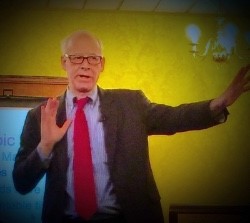“Most assignments were written before the internet,” according to Alan November, an international leader in educational technology who spoke this week to OSU faculty and staff on “Who Owns Learning?”
November challenged attendees to reconsider the way they teach and the way they think about how students learn. Highlights of his presentation can be summed up in the following tips.
Tips for Teaching and Learning
Create assignments and activities that prepare students for when faculty aren’t in the room. Start by ensuring students have lots of opportunity to self-assess. Students should evaluate their work effort/ethic, the content/quality of their work, and what their “official” grade should be. If there’s a discrepancy between their assessment of a grade and the actual grade, students should reconcile why the difference exists.
Recognize that the two greatest contributions of the internet to student learning are primary sources and global perspectives. Refine, revise, or rewrite assignments to “meet the power of the internet,” recognizing an overabundance of information and lack of knowledge.
Think about “ramping up the cleverness of the assignment to application and not acquisition.” Because knowledge is the application of information, the more challenging questions or tasks ask students to apply information. In addition, learning activities that force students to “determine where the truth is” build knowledge and force critical thinking.
Build skill sets for the digital age instead of being limited by “paper thinking,” which tends to be linear. The internet requires pattern recognition and new research strategies that are rarely taught in the formal curriculum, and which few faculty have mastered. (See Google operators below.)
Beware the “Curse of Knowledge” or a cognitive bias that makes it difficult for experts to think about problems from the perspective of those who are less informed. Students ask more questions online and anonymously than they do in class or face-to-face. An anonymous class Q&A discussion board led by students might prove revealing and useful.
Educational Technology Tips
Learn the Google operators: Google operators allow individuals to search results as they would appear in a different country; restrict searches based on terms in titles, text, or URL’s; or limit searches to specific news sources. For example, if you type “site:au” the results appear for Australia. To learn about Google operators, click here: http://www.googleguide.com/advanced_operators_reference.html.
Use Diigo, or a similar system to organize an online knowledge collection, annotate sources, and share research with colleagues or associates. Diigo stands for “Digest of Internet Information, Groups and Other stuff.” For more information, go to: https://www.diigo.com/about.
Try out PRISM to capture and create a visual representation of how students are interpreting a document, journal article, etc. To test out this “crowdsourcing interpretation” tool, visit: http://prism.scholarslab.org/?locale=en.
(Most important, don’t try to do everything at one time. Pick and choose your technology solutions and experiment before you implement.)
To see Alan November’s entire presentation, click on this link: https://mediasite.osu.edu/Mediasite/Play/07157d23c1a24964993b477e728e3c421d. His presentation — made possible through the Office of Distance Education and eLearning — starts 18 minutes into the video.
